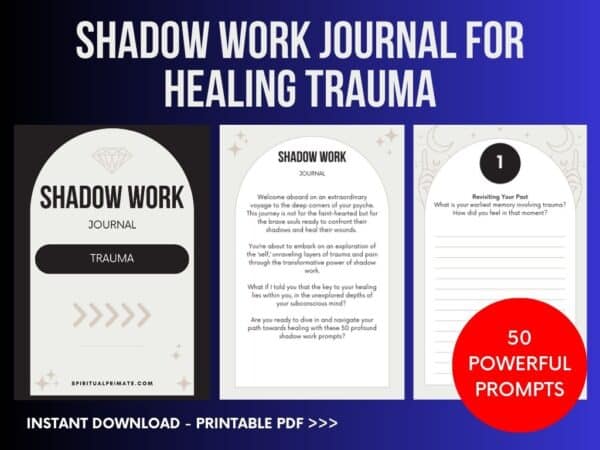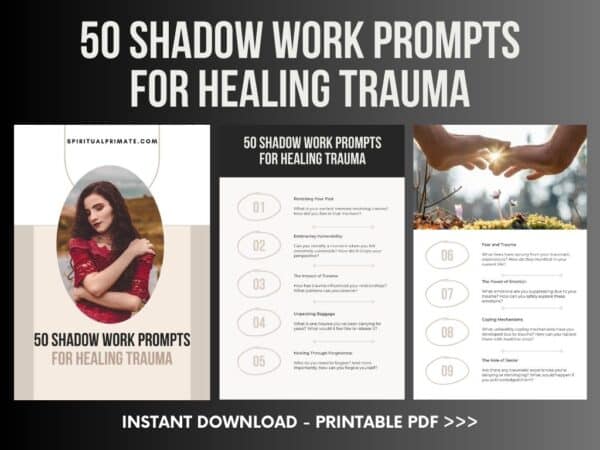Welcome aboard on an extraordinary voyage to the deep corners of your psyche. This journey is not for the faint-hearted but for the brave souls ready to confront their shadows and heal their wounds. You’re about to embark on an exploration of the ‘self,’ unraveling layers of trauma and pain through the transformative power of shadow work.
What if I told you that the key to your healing lies within you, in the unexplored depths of your subconscious mind? Are you ready to dive in and navigate your path towards healing with these 50 profound shadow work prompts?

Understanding Trauma
Trauma is a deeply distressing or disturbing experience that has a lasting impact on an individual’s mental, physical, and emotional health. It often results from significant stress that overwhelms a person’s ability to cope. This can be the result of a single event, such as a violent assault or natural disaster, or it can stem from ongoing, chronic conditions like abuse or neglect.
Trauma can lead to a range of emotional, psychological, and physical symptoms, including anxiety, depression, post-traumatic stress disorder (PTSD), and even physical health issues.
It’s important to note that trauma is subjective and depends on a person’s individual experience and resilience; what may be traumatic for one person might not be for another.

Shadow Work: A Powerful Tool for Trauma Healing
Shadow work is a therapeutic technique that can play a pivotal role in trauma healing. Derived from the theories of Swiss psychiatrist Carl Jung, shadow work involves identifying and understanding the ‘shadow self’ – those parts of our psyche that we have pushed into the unconscious because they are deemed unacceptable.
The process of shadow work begins with consciousness. By bringing these buried aspects of ourselves to light, we can begin to understand and integrate them, which can lead to profound personal growth and healing. This is particularly beneficial for individuals dealing with trauma, as it allows them to confront and process painful experiences that they may have suppressed.
Shadow work can help trauma survivors in several ways:
1. Understanding the Self: Shadow work can help individuals gain a deeper understanding of their personality, including their fears, desires, and motivations. This can lead to increased self-acceptance and self-compassion, both of which are crucial for trauma healing.
2. Reprocessing Traumatic Memories: Trauma often leads to memories being stored in a disorganized manner, leading to flashbacks and intrusive thoughts. Shadow work can help individuals reprocess these memories in a controlled environment, reducing their emotional impact.
3. Breaking Negative Patterns: Trauma can lead to the development of negative patterns of behavior, such as avoidance, self-sabotage, or self-blame. Shadow work can help individuals identify these patterns and work towards breaking them.
4. Emotional Regulation: By confronting and integrating the shadow self, individuals can better regulate their emotions, reducing symptoms of anxiety, depression, and post-traumatic stress disorder (PTSD).
5. Building Resilience: Through shadow work, individuals can learn to accept and work through their pain, rather than avoiding it. This can increase their resilience and ability to cope with future stressors.
In conclusion, shadow work can be a powerful tool for trauma healing, leading to increased self-understanding, emotional regulation, and resilience. However, it should be undertaken with the guidance of a trained professional, as it can bring up intense emotions and memories.

Shadow Work Prompts for Healing Trauma
1. Revisiting Your Past: What is your earliest memory involving trauma? How did you feel in that moment?
2. Embracing Vulnerability: Can you identify a moment when you felt extremely vulnerable? How did it shape your perspective?
3. The Impact of Trauma: How has trauma influenced your relationships? What patterns can you observe?
4. Unpacking Baggage: What is one trauma you’ve been carrying for years? What would it feel like to release it?
5. Healing Through Forgiveness: Who do you need to forgive? And more importantly, how can you forgive yourself?
6. Fear and Trauma: What fears have sprung from your traumatic experiences? How do they manifest in your current life?
7. The Power of Emotion: What emotions are you suppressing due to your trauma? How can you safely explore these emotions?
8. Coping Mechanisms: What unhealthy coping mechanisms have you developed due to trauma? How can you replace them with healthier ones?
9. The Role of Denial: Are there any traumatic experiences you’re denying or minimizing? What would happen if you acknowledged them?
10. Lessons from Trauma: What have your traumatic experiences taught you? Can you find any positive lessons?
11. Identifying Triggers: What triggers remind you of your trauma? How can you manage these triggers?
12. The Child Within: How would you comfort your younger self who experienced trauma? What words would you say?
13. The Body’s Memory: How does your body remember trauma? What physical sensations arise?
14. Self-Care and Trauma: How can you better care for yourself while navigating trauma? What self-care practices resonate with you?
15. Trauma and Trust: How has trauma affected your ability to trust others? How can you rebuild this trust?
16. Trauma in Dreams: How does your trauma surface in your dreams? What recurring themes or symbols appear?
17. Trauma and Self-Identity: How has trauma shaped your self-identity? What narratives do you need to rewrite?
18. Reclaiming Power: How can you reclaim your power from your traumatic experiences? What steps can you take?
19. Art and Trauma: Can you express your trauma through art? What would it look like?
20. Trauma and Isolation: How has trauma made you feel isolated? How can you reach out?
21. Trauma and Shame: What shame are you carrying because of your trauma? How can you release this shame?
22. The Language of Trauma: How would you describe your trauma if it was a language? What words or phrases stand out?
23. Boundaries and Trauma: How has trauma affected your ability to set boundaries? How can you strengthen them?
24. Trauma and Resilience: How has trauma made you more resilient? Can you see your strength?
25. The Mask of Trauma: What masks do you wear to hide your trauma? What would happen if you removed them?
26. Seeing Trauma: How would you visualize your trauma? What images or colors come to mind?
27. Trauma and Loss: What have you lost as a result of your trauma? How can you grieve these losses?
28. Trauma and Growth: How can you use your trauma as a catalyst for growth? What areas of your life can you improve?
29. Trauma and Intuition: How has trauma impacted your intuition? How can you learn to trust it again?
30. Trauma and Connection: How has trauma affected your connection with others? How can you cultivate deeper connections?
31. The Sound of Trauma: If your trauma had a sound, what would it be? How can it guide your healing process?
32. Celebrating Progress: What progress have you made in your healing journey? How can you celebrate these wins?
33. Trauma and Compassion: How can you show more compassion towards yourself as you heal from trauma? What does self-compassion look like to you?
34. The Taste of Trauma: If your trauma had a taste, what would it be? How does this inform your understanding of it?
35. Trauma and Attachment: How has trauma affected your attachment style? How can you nurture a more secure attachment?
36. Trauma and Body Image: How has trauma shaped your relationship with your body? How can you cultivate a healthier body image?
37. Trauma and Self-Expression: How does trauma influence your self-expression? How can you reclaim your voice?
38. Trauma and Perception: How has trauma colored your perception of the world? How can you challenge these perceptions?
39. Trauma and Safety: What does safety mean to you in the context of trauma? How can you create a safe space for healing?
40. The Smell of Trauma: If your trauma had a smell, what would it be? How does this deepen your understanding of your experience?
41. Trauma and Hope: Where can you find hope in your healing journey? What are your hopes for the future?
42. Trauma and Patience: How can you exercise more patience with yourself during your healing process? What does patience look like to you?
43. Trauma and Acceptance: How can you move towards accepting your traumatic experiences? What steps can you take?
44. Trauma and Gratitude: Is there anything you can be grateful for in your healing journey? How does gratitude show up for you?
45. Trauma and Self-Worth: How has trauma impacted your sense of self-worth? How can you nurture a stronger sense of worthiness?
46. Trauma and Inner Peace: How can you find inner peace amidst the chaos of trauma? What practices can bring peace?
47. Trauma and Joy: How can you invite more joy into your life as you heal from trauma? What brings you joy?
48. Trauma and Mindfulness: How can mindfulness support your healing journey? What mindfulness practices resonate with you?
49. Trauma and Transformation: How can you transform your trauma into something positive? What change would you like to see?
50. Trauma and Release: What would it feel like to fully release your trauma? How can you work towards this release?
As we wrap up this expedition of self-discovery and healing, remember that every individual’s journey is unique. The shadows you’ve faced, the wounds you’ve tended, they all form the intricate tapestry of your healing process.
It takes immense courage to confront your traumas but remember, in that courage lies your power to heal. You’ve made it this far and navigated the complexities of your psyche with these 50 profound shadow work prompts.
Now, with newfound understanding and acceptance, are you ready to step into the light, embracing the completeness of who you are?
Dive Deeper Into Your Shadow Work Journey
- Product on sale
 Printable Shadow Work Journal for Healing Trauma [PDF]Original price was: $11.98.$5.99Current price is: $5.99.
Printable Shadow Work Journal for Healing Trauma [PDF]Original price was: $11.98.$5.99Current price is: $5.99. - Product on sale
 50 Shadow Work Prompts for Healing Trauma | Printable PDFOriginal price was: $5.98.$2.99Current price is: $2.99.
50 Shadow Work Prompts for Healing Trauma | Printable PDFOriginal price was: $5.98.$2.99Current price is: $2.99.

